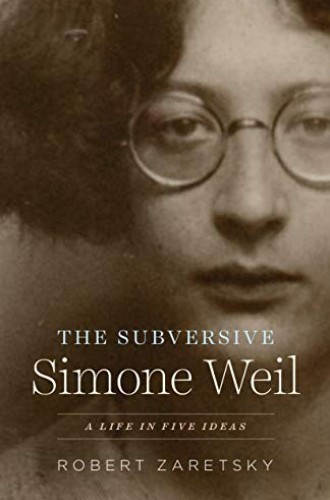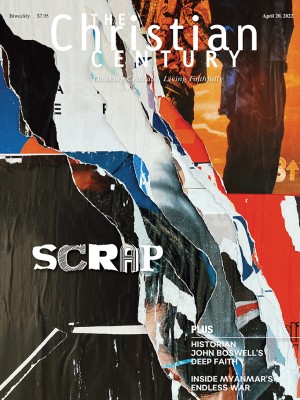For Simone Weil, philosophy was not merely academic
Robert Zaretsky offers a vivid picture of how truth telling made Weil’s life complicated.
It’s a commonplace to note the contradictions in Simone Weil’s life. She was an anarchist and a conservative, a pacifist and a war fighter, a French patriot and a critic of France, a Jew who was buried in the Catholic section of an English cemetery. Robert Zaretsky believes that these contradictions reflect “inevitable tensions” that arose as Weil inhabited her philosophical convictions. For her, philosophy could not be a merely academic discipline; it had to be a “way of life.” You had to accept the consequences of the truth you told, had to live them out, and that was complicated.
Zaretsky begins his brief study of Weil by describing the arc of her short life. Paris-born, she grew up with nonobservant Jewish parents who had fled Russian pogroms and were both cultured and well-to-do. They also raised a child whose passions—practically from day one—were very like those of a Hebrew prophet. Zaretsky fully acknowledges yet strangely plays down her life’s religious coloring and so describes Weil’s schoolgirl identification with “striking workers” and lifelong commitment to justice without noting this comparison. Still, in compelling and graceful prose, he offers a vivid picture of someone who took uncompromising notice of human pain and sought both to identify with it and to take action toward its alleviation.
Read our latest issue or browse back issues.
Detailed biographies of Weil already exist, and in that light Zaretsky hastens on to his main work of exploring “a small number of core themes in her thought.” He devotes a chapter to each, beginning with Weil’s analysis of affliction.
After graduating from the elite École Normale Supérieure in Paris, Weil taught briefly in three provincial towns, traveling evenings from one of them to teach literature at a nearby factory workers’ co-op. Language mastery, she believed, would both enrich and empower the workers she was determined to understand. Soon she applied for a factory job. The baffled owner—who understood elite education, having received one himself—assigned her to a “stamping press.” Weil’s journal was soon suggesting that satisfying work involves initiative and thinking—and that factories suppress just these capacities. The machines join relentless economic and production objectives in putting dehumanizing pressure on workers, even on bosses and owners. People have little or no time to think; their jobs, in any case, don’t require thinking. Turned into mere things, they feel both anxious and ashamed.
The result is a form of suffering Weil called affliction, a sense of overwhelming brokenness and degradation. If, as Zaretsky would agree, her account of the factory experience seems a little short on nuance, it still captures the horror of unalloyed oppression. In their attempt to secure unanimity by coercion, totalitarian states, for example, do turn humans into things—or sometimes ashes. When human force evokes “extreme affliction,” it can rob people of the “power to say ‘I.’”
The book next addresses Weil’s insistence on the ethical dimension of knowing. Finding out about things is an obligation—otherwise you may, she said, be an accomplice in evil—and the key to finding out is what she called attention. More than a muscular effort of concentration, true attention is a gaze unblighted by selfish reflex. To see fully what we may have learned not to see—and may not want to see—requires, said Weil, “the rarest and purest form of generosity.” We must let go of self, or of what Weil admirer Iris Murdoch, the atheist philosopher and novelist, called the “fat, relentless ego,” and turn to the world, turn to the other. Deep knowing thus requires spiritual discipline, a prolonged and difficult realization that there is more than me.
The third of the core themes Zaretsky considers is resistance. Weil believed that the risk of anarchy requires commitment to obedience in civil society but not sheer surrender. The “collectivity”—the groupings and related cultural forces that induce intellectual slumber and strip away thought—must be faced with the suspicion and possible defiance of the citizenry. Disciplined, thought-based resistance is protection against tyranny. It must resist the temptation to inertia and the magical thinking that things will work out while we do nothing. When the point is to defend justice and truth, and when there is no other recourse, resistance must be ready even to break the law. Confronted with a choice between moral duty and civil law, Antigone, of the eponymous Greek tragedy, declared, “I will not be moderate.”
Antigone’s example inspired what Zaretsky calls Weil’s “immoderate attachment” to her own ideals. And because such attachment involves thought and faces complications, it brought her into conflict with herself. Even in the face of rising Naziism, Weil at first scorned warmongers: armaments would only produce massacre. Later, fearing complicity with evil, she changed her mind and at one point found herself bearing a weapon against Franco in the Spanish Civil War.
Even then, however, conscience left her in conflict with herself. She told a friend, “Happily, I am so myopic that there’s no risk of my killing others, even when I am aiming at them.” And she complained of atrocities on her own side as well as the other one. “Never once,” she said in a letter, did anyone in her hearing express “repulsion or disgust or even disapproval of useless bloodshed.” If resistance is necessary, it is also, as her thought and life both attest, morally troubling.
What Weil called “the need for roots” is the book’s next focus. Here Weil comes across as conservative—her issue is the importance and nature of true patriotism—but she does so in a way that nationalists would find deeply challenging. Civic health, she contends, cannot emerge either from moral abstractions or from merely economic motivations. Civic health requires a local or geographically bounded cultural center—some sense, in other words, of home and place. This center, or in Weil’s basic metaphor, root system, addresses both material need and the need for identity and purpose. For her, uprootedness—what France and other parts of Europe were facing as a result of Nazi aggression—leaves behind only “debris and despair,” as Zaretsky puts it, only “atomization and anomie.”
But if Weil affirms the patriotic love of home and place, she repudiates “the lies and contradictions which corrode the idea of patriotism.” She was disgusted by French imperialism and colonization. Nor could she abide the thought of the nation as “absolute value.” True patriotism acknowledges the flaws and crimes of home and place. True patriotism, indeed, upholds compassion for all. Compassion, Weil writes, can “cross frontiers, extend itself over all countries in misfortune, over all countries without exception.” All peoples, after all, “are subjected to the wretchedness of our human situation.” The need to repel the German occupiers existed side by side with a duty to regard Germans as fellow human beings. The “obligation”—for Weil, a crucial word—to meet human need always obtains, regardless of circumstance.
Zaretsky then takes up Weil’s slow, if also incomplete, turn toward Catholicism. Religion had fascinated her from her student days. Later, key mystical experiences, one while visiting a chapel in Assisi and two while witnessing deeply evocative liturgical services, awakened in her a sense of the divine. This led, in the five years before her death at 34, to what Zaretsky calls “a brilliant and often bruising dialogue with Christianity.” From letters to her two main interlocutors came the startling notes and aphorisms collected into her posthumously published Waiting for God and Gravity and Grace. And if in these and other works Weil’s perspective is sometimes disturbing, as Zaretsky does not shrink from saying, one reason is what comes through from start to finish in his book: Weil’s implacable moral severity. We humans are offered a world in which we can love God, and to love God is to wage unremitting war on the self, on the “I” in pursuit of its own ends.
Zaretsky passes over the background metaphysical issue—does God actually help us?—and instead spends much of this chapter interpreting Weil through the lens of her great admirer Iris Murdoch. Murdoch thought “God” was just an idea invented “to make the difficult task of virtue look easier and more attractive.” What remains, though, is the idea of “the Good,” or of the morally perfect. If we make that idea the object of contemplation, Murdoch contends, it may help us “pierce the veil of selfish consciousness.” But she quickly adds that empirical evidence about human nature shows that our efforts here “cannot be entirely successful.”
To this, Zaretsky replies with the story of the Christians in Le Chambon-sur-Lignon, in France, who saved some 3,000 Jews from Nazi death. Their vision was clear; they read the world aright. Here, though, Zaretsky fails to mention two points. One is Weil’s two-fold conviction—expressed in The Need for Roots, her vision for a postwar France—that God assures a universe in which “good outweighs evil” and that, by “particular volition,” God inspires the soul to holiness. The other is that the pastor in Le Chambon, André Trocmé, carefully schooled his congregation in the Jesus story, emphasizing themes of nonviolence and universal love. The congregation’s vision, it turns out, was based in narrative, nourished by tradition.
Neither narrative nor tradition plays an important role in Zaretsky’s exploration of “the subversive Weil.” The concepts may, I think, be implied in her pleas for “home” and “place,” but a more explicit consideration of them would generate further fruitful engagement of this woman’s astonishing life and thought.






